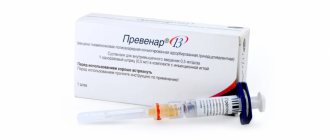Pneumococcal infection
Pneumococcal infection is a respiratory viral infection that causes a complex of diseases such as pneumococcal pneumonia, acute otitis media, purulent meningitis, endocarditis, pleurisy, arthritis, sinusitis, conjunctivitis.
Pneumococcal infection is spread through respiratory droplets, such as coughing and sometimes through contact. The source of infection is a person without any clinical manifestations. However, pneumococcal pathology occurs in wild animals and domestic ungulates (sheep, goats, calves).
Risk group
The highest incidence of severe pneumococcal infections is recorded in children under 5 years of age. Young children under 2 years of age, whose bodies are unable to resist infections, are especially defenseless.
Risk groups also include adults with chronic diseases of the cardiovascular and respiratory systems, diabetes mellitus, liver cirrhosis, and chronic renal failure.
This should also include the so-called “organized” contingents - children attending kindergartens, students living in dormitories, military personnel, residents of nursing homes, prisoners and other children and adults living in “overcrowded” conditions.
Immunization against pneumococcus
The article was prepared by pediatrician Yulia Aleksandrovna Ermolaeva
Vaccination against pneumococcal infection causes the least number of refusals and disputes among parents, since many have heard about the widespread prevalence of pneumococcus.
Its carriage reaches 70% in the population. Pneumococcal infection causes not only acute respiratory infections, pneumonia, otitis, but also such serious diseases as meningitis, arthritis, myocarditis, sepsis, which are difficult to treat.
Self-healing from pneumococcal infection is quite rare and more often there is a need for long courses of antibiotic therapy. Difficulties in treatment will be explained by the resistance of this microbe to antibiotics, due to the widespread use of this group of drugs in recent years.
This reason is the main one determining the need for vaccination. Please note that vaccination with pneumococcal vaccines does not protect against all acute respiratory infections; immunity is formed only to a specific type of pathogen that is included in the vaccine. Accordingly, if the causative agent of the disease is a virus or another bacterial agent, it is incorrect to attribute the disease to the ineffectiveness of this vaccination.
Which vaccine is better Prevenar 13 or Pneumo 23?
There are 96 known serotypes of pneumococci, of which only 20 cause severe illness, the rest, for the most part, do not pose a threat to human health. Vaccination with pneumococcal vaccines protects only against those pneumococci whose serotypes are included in the vaccine.
There are 2 types of vaccines currently registered in the Russian Federation:
- conjugated (Prevenar13, Russia, USA, Netherlands)
- polysaccharide (Pneumovax 23, Netherlands and Pneumo 23, France)
Conjugate vaccines contain 13 serotypes, and polysaccharide vaccines contain 23 serotypes. The Synflorix vaccine has also been developed, which, in addition to 10 serotypes of pneumococcus, includes ADS + Haemophilus influenzae. A natural question arises which vaccine is better to choose.
The conjugate vaccine includes 13 of the most common serotypes; this type of vaccine causes lasting immunity, unlike polysaccharide vaccines, and is approved for use from 2 months of age.
The duration of the immune response when administered polysaccharide vaccines is no more than 5 years, and therefore revaccination with this vaccine is required every 5 years.
But polysaccharide vaccines contain a larger number of serotypes, so frequently ill children, patients with chronic diseases, immunodeficiency conditions, and the elderly can be recommended to administer an additional dose of Pneumo 23 after vaccination with Prevenar 13!
When combining 2 types of pneumococcal vaccines, immunity against pneumococcus will be durable and protect against almost all major pathogenic serotypes of pneumococcus.
Can I get pneumococcal infection after vaccination?
No. Pneumococcal vaccines are non-live; they contain only bacterial antigens, so they do not cause disease.
When is the best time to get vaccinated?
The vaccination schedule against pneumococcal infection has a clear tendency to decrease the number of vaccinations with the age of the child. So, when vaccination starts at 2 months, to create sufficient immunity and carry out a full course of vaccination, 3 administrations of this vaccine will be required, and for children over 2 years old - only one, according to the national calendar of the Russian Federation.
Therefore, many parents ask the question: “why torture a child so much at an early age, he already has a heavy vaccination burden?” The answer is simple. Pneumococcus can strike at any age, but infections in early childhood are much more severe. That is why vaccination against pneumococcus was one of the first to be introduced into the national calendar and is recommended from 2 months of life.
Regarding polysaccharide vaccines, their use is allowed only from 2 years of age.
How to vaccinate correctly if the timing of administration is not met?
Below will be presented vaccination schedules with pneumococcal vaccines in accordance with Order of the Ministry of Health of the Russian Federation No. 125n dated March 21, 2014 as part of the calendar of preventive vaccinations for epidemiological indications. Please note that individual vaccination schedules differ.
Vaccination with conjugate vaccines:
- Basic vaccination schedule: 2 months, 4.5 months + revaccination at 15 months.
- Start of vaccination after 6 months: twice with revaccination in the 2nd year of life. Revaccination is carried out no earlier than 6 months from the last administration.
- Start of vaccination at the age of 12 – 23 months: twice with an interval of at least 8 weeks.
- Over 2 years old without age limit: once.
- Premature babies are vaccinated from 6 weeks according to the following schedule: 3 doses at monthly intervals and revaccination at 12-15 months.
Missed vaccinations with conjugate vaccines do not require repetition; the schedule is determined based on the child’s age. Examples of missed vaccination dates:
- 1 dose up to a year. For children aged 12-23 months, 2 doses are administered at an interval of 8 weeks; over 2 years, one dose is administered once.
- 1 dose at 12-23 months of age, then only one dose is required in any case.
Further revaccinations are not required when receiving the full course of Prevenar 13. Formed immunity is stable.
Polysaccharide vaccines are recommended to be included in a sequential vaccination regimen. At the first stage, a full course of vaccination is carried out with a conjugate vaccine, and at the second - with a polysaccharide vaccine.
The optimal interval between administrations is 12 months, but for children aged 12–18 years and adults in special situations, the interval can be shortened to 8 weeks.
Revaccination with polysaccharide vaccines, if indicated, is carried out with an interval between doses of at least 5 years.
Can the pneumococcal vaccine be combined with other vaccinations?
Yes. Pneumococcal vaccines can be administered simultaneously with any vaccines from the national calendar, except BCG, but in different parts of the body.
Contraindications to vaccination with pneumococcal vaccines:
- severe, severe systemic reactions to previous vaccine administration
- (anaphylactic reactions);
- hypersensitivity to any component of the vaccine;
- acute infectious diseases or exacerbation of chronic ones.
So, the main conclusions:
- Vaccination against pneumococcal infection is mandatory.
- For children and adults at risk for developing pneumococcal infection, a sequential course of immunization is recommended, consisting of the initial administration of a conjugate vaccine (Prevenar 13) followed by the use of a polysaccharide vaccine (Pneumo 23, Pneumovax).
- Vaccination starts from 2 months of age - with a conjugate vaccine (Prevenar 13), from 2 years - with a polysaccharide vaccine (Pneumo 23, Pneumovax).
MAKE AN APPOINTMENT WITH A PEDIATOR
Clinical manifestations
Symptoms of pneumococcal infection, which causes pneumonia, include fever, cough, shortness of breath, and chest pain.
Symptoms of pneumococcal purulent meningitis are severe headache, fever, confusion, photophobia.
A global problem that complicates the fight against pneumococcal infection is the resistance of pneumococcus to antibiotics.
Currently, vaccination is used to prevent diseases caused by pneumococcal infection all over the world!
PNEUMOVAX vaccine is a vaccine against pneumococcal infection. It has an immunostimulating effect; a single administration of the vaccine forms active specific immunity to various types of streptococcal bacteria. Laboratory studies confirm that after the vaccine is administered, immune cells recognize foreign objects and form specific antibodies. The vaccine covers 90% of the world's invasive serotypes. Vaccines against pneumococcal infection have been used for a long time and very successfully, and Pneumovax 23 is considered one of the most famous and effective vaccines.
Healthy safety net
Mask, I don’t know you: Muscovites ignore means of protection against the virus
Meanwhile, due to the worsening epidemic situation in the capital, “Covid” buildings are opening again
Russian immunologists and epidemiologists strongly recommend that adults and children get vaccinated against pneumococcus to protect themselves against coronavirus infection. These vaccinations can significantly improve the functioning of the barrier immunity of the mucous membranes, Andrei Prodeus, a research professor at the Kant IKBFU, told Izvestia.
“This is an absolutely confirmed fact: those vaccinated against pneumococcus have less chance of becoming infected and are less susceptible to complications,” said the specialist. “Their immunity can resist any respiratory viruses, including SARS-COV-2. In some regions of Russia, the pneumococcal vaccine is included in free regional programs.
According to the scientist, control of pneumococcal infection seriously reduces any complications of respiratory diseases, especially among children. We are talking about diseases such as purulent otitis media, community-acquired pneumonia, and sinusitis. Most of them are caused by pneumococcus, so if the patient is protected from it, he will recover much faster, added Andrei Prodeus.
Course of injections
Photo: IZVESTIA/Andrey Ershtrem
Discussions about whether a vaccine against pneumococcal infection can also save against COVID-19 have been going on in the scientific world for a long time. Various scientific articles provide evidence that such vaccinations can worsen the condition of those infected or have no effect on their health. However, recent observations show that in countries where the population of pneumococcal vaccinations is higher, mortality from coronavirus is lower.
Focus in the group: why the COVID-19 test is wrong
A connection was found between a false negative test result and the presence of high platelets and C-protein in the blood
In particular, a scientific group from Italy, which included specialists from the geriatric departments of the Faculty of Medicine of the University of Padua and the Biomedical Campus in Rome, published an article in which they analyzed how vaccination against influenza and pneumococcus correlates with the results of PCR tests for COVID-19. The study found that adult and older respondents who received a pneumococcal vaccine in the past year were much less likely to test positive for coronavirus compared to their unvaccinated peers.
Reviews
Pneumovax 23 is widely used, so you can easily find many reviews from people who have used it. Most reviews are positive, and patients claim that they tolerated this vaccination well and then did not get sick with pneumococcal infection.
But there are also negative comments that there were complications with the drug. You should not rely only on the opinions of other people, because various side effects are associated only with individual intolerance to the vaccine; in order to make a final decision about whether you need this vaccination or not, consult your doctor.







